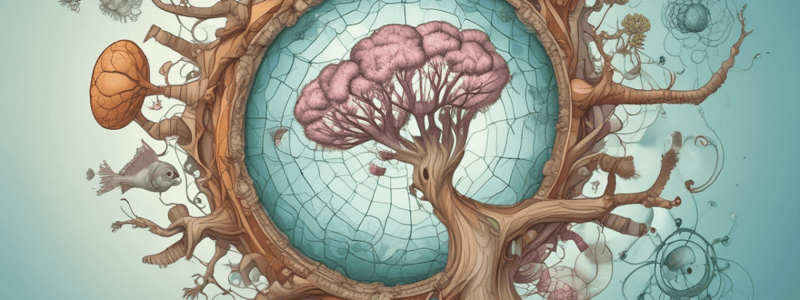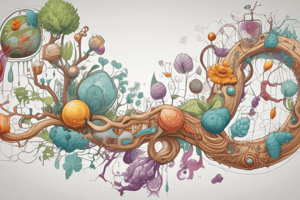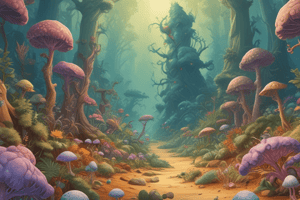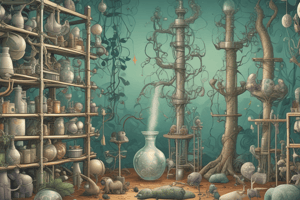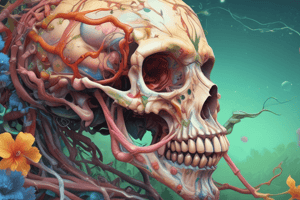Podcast
Questions and Answers
Genetics is the study of chemical processes in living organisms.
Genetics is the study of chemical processes in living organisms.
False (B)
Cell membranes are completely permeable to all substances.
Cell membranes are completely permeable to all substances.
False (B)
Photosynthesis involves the conversion of chemical energy into light energy.
Photosynthesis involves the conversion of chemical energy into light energy.
False (B)
Mitochondria are responsible for generating energy through cellular respiration.
Mitochondria are responsible for generating energy through cellular respiration.
Botany is the study of microorganisms.
Botany is the study of microorganisms.
The theory of evolution is based on the concepts of natural selection and genetic drift.
The theory of evolution is based on the concepts of natural selection and genetic drift.
Ribosomes are the organelles responsible for the cell's energy production.
Ribosomes are the organelles responsible for the cell's energy production.
Meiosis is the process that leads to the formation of diploid cells.
Meiosis is the process that leads to the formation of diploid cells.
Flashcards are hidden until you start studying
Study Notes
Definition and Scope
- Biology: the scientific study of life and living organisms, including their structure, function, growth, evolution, distribution, and taxonomy.
- Scope: encompasses all aspects of life, from molecules to ecosystems.
Branches of Biology
- Botany: study of plants
- Zoology: study of animals
- Microbiology: study of microorganisms
- Ecology: study of interactions between organisms and their environment
- Genetics: study of heredity and variation
- Biochemistry: study of chemical processes in living organisms
- Molecular Biology: study of biological molecules and their interactions
- Cell Biology: study of cell structure, function, and behavior
- Evolutionary Biology: study of the processes that have shaped the diversity of life
- Biophysics: study of the physical principles underlying biological processes
Biological Molecules
- Carbohydrates: energy-rich molecules, e.g., sugars, starches
- Proteins: complex molecules performing various functions, e.g., enzymes, hormones
- Lipids: energy-rich molecules, e.g., fats, oils
- Nucleic Acids: DNA and RNA, containing genetic information
- ATP (Adenosine Triphosphate): energy currency of the cell
Cell Structure and Function
- Cell membrane: semi-permeable membrane surrounding the cell
- Cytoplasm: jelly-like substance inside the cell membrane
- Nucleus: contains genetic material (DNA)
- Mitochondria: generate energy for the cell through cellular respiration
- Ribosomes: site of protein synthesis
- Lysosomes: contain digestive enzymes, recycle cellular waste
Biological Processes
- Photosynthesis: conversion of light energy into chemical energy
- Cellular Respiration: generation of energy from glucose
- Mitosis: process of cell division
- Meiosis: process of gamete formation
- Gene Expression: process by which genetic information is converted into a functional product
Evolution and Diversity
- Theory of Evolution: explains the diversity of life through natural selection and genetic drift
- Speciation: process by which new species emerge
- Phylogeny: study of evolutionary relationships between organisms
- Classification: grouping of organisms based on shared characteristics and evolutionary relationships
Definition and Scope
- Biology examines life and living organisms, and their structure, function, and evolution.
- The scope of biology includes all life aspects, from molecular levels to entire ecosystems.
Branches of Biology
- Botany: Focuses on plant life.
- Zoology: Centers around animal species.
- Microbiology: Investigates microscopic organisms.
- Ecology: Explores interactions between organisms and their environments.
- Genetics: Studies heredity and genetic variation among organisms.
- Biochemistry: Analyzes chemical processes in living systems.
- Molecular Biology: Examines biological molecules and their interactions.
- Cell Biology: Investigates cell structures and their functions.
- Evolutionary Biology: Studies the processes driving the diversity of life forms.
- Biophysics: Applies physical principles to biological phenomena.
Biological Molecules
- Carbohydrates: Serve as energy sources, comprising sugars and starches.
- Proteins: Complex molecules that include enzymes and hormones, crucial for various biological functions.
- Lipids: Energy-dense molecules, such as fats and oils, vital for cellular structure.
- Nucleic Acids: DNA and RNA, which store and transmit genetic information.
- ATP (Adenosine Triphosphate): Main energy currency of cells.
Cell Structure and Function
- Cell Membrane: A semi-permeable barrier that regulates entry and exit of substances.
- Cytoplasm: Gel-like substance that supports cellular components inside the membrane.
- Nucleus: Houses the cell's DNA, controlling genetic information and activities.
- Mitochondria: Powerhouses of the cell, converting nutrients into energy through respiration.
- Ribosomes: Sites for protein synthesis, translating genetic information into proteins.
- Lysosomes: Contain enzymes for cellular digestion and waste recycling.
Biological Processes
- Photosynthesis: Biological process that transforms light energy into chemical energy stored in glucose.
- Cellular Respiration: Process generating ATP by breaking down glucose.
- Mitosis: Cellular division resulting in two identical daughter cells.
- Meiosis: Special form of cell division that produces gametes (sex cells).
- Gene Expression: Mechanism converting genetic information into functional products like proteins.
Evolution and Diversity
- Theory of Evolution: Describes how species evolve over time through natural selection and genetic drift.
- Speciation: Formation of new and distinct species in the course of evolution.
- Phylogeny: Analysis of the evolutionary relationships among organisms.
- Classification: Organizing organisms into groups based on similarities and shared ancestry.
Studying That Suits You
Use AI to generate personalized quizzes and flashcards to suit your learning preferences.
